For many people, the dream of owning a dog is hampered by allergies. The thought of itchy eyes, sneezing fits, and respiratory distress can put a damper on the joy of canine companionship. Fortunately, the world of dog breeds offers a ray of hope for allergy sufferers: dogs that shed minimally, often referred to as “hypoallergenic.” While no dog is completely allergen-free, certain breeds are genetically predisposed to produce fewer allergens, making them a more suitable choice for sensitive individuals.
If you’re searching for a canine friend that won’t exacerbate your allergies, focusing on breeds that shed little to nothing is key. This comprehensive guide explores some of the best small to medium breed dogs that don’t shed, offering insights into their characteristics, care needs, and suitability as family pets. By understanding these breeds, you can make an informed decision and find the perfect furry companion to share your life.
Understanding “Hypoallergenic” Dog Breeds
The term “hypoallergenic” in the context of dogs refers to breeds that are less likely to trigger allergic reactions. It’s crucial to understand that all dogs produce allergens, primarily found in their dander (dead skin cells), saliva, and urine. Shedding plays a significant role in how these allergens spread. Dogs that shed less tend to distribute fewer allergens throughout your home, thus reducing the likelihood of an allergic response.
It’s important to note that even breeds considered hypoallergenic can still cause reactions in highly sensitive individuals. Therefore, spending time with the specific dog breed you’re considering is always recommended before bringing one home. For those specifically seeking smaller canine companions, there are numerous small active dogs that don’t shed which can be ideal for apartment living or active families.
Small to Medium Breed Dogs That Don’t Shed: A Comprehensive List
The following breeds are celebrated for their minimal shedding, making them excellent choices for allergy sufferers and anyone who prefers a cleaner home. We’ll delve into their temperaments, grooming needs, and suitability for various lifestyles.
1. Poodle (Toy, Miniature, Standard)
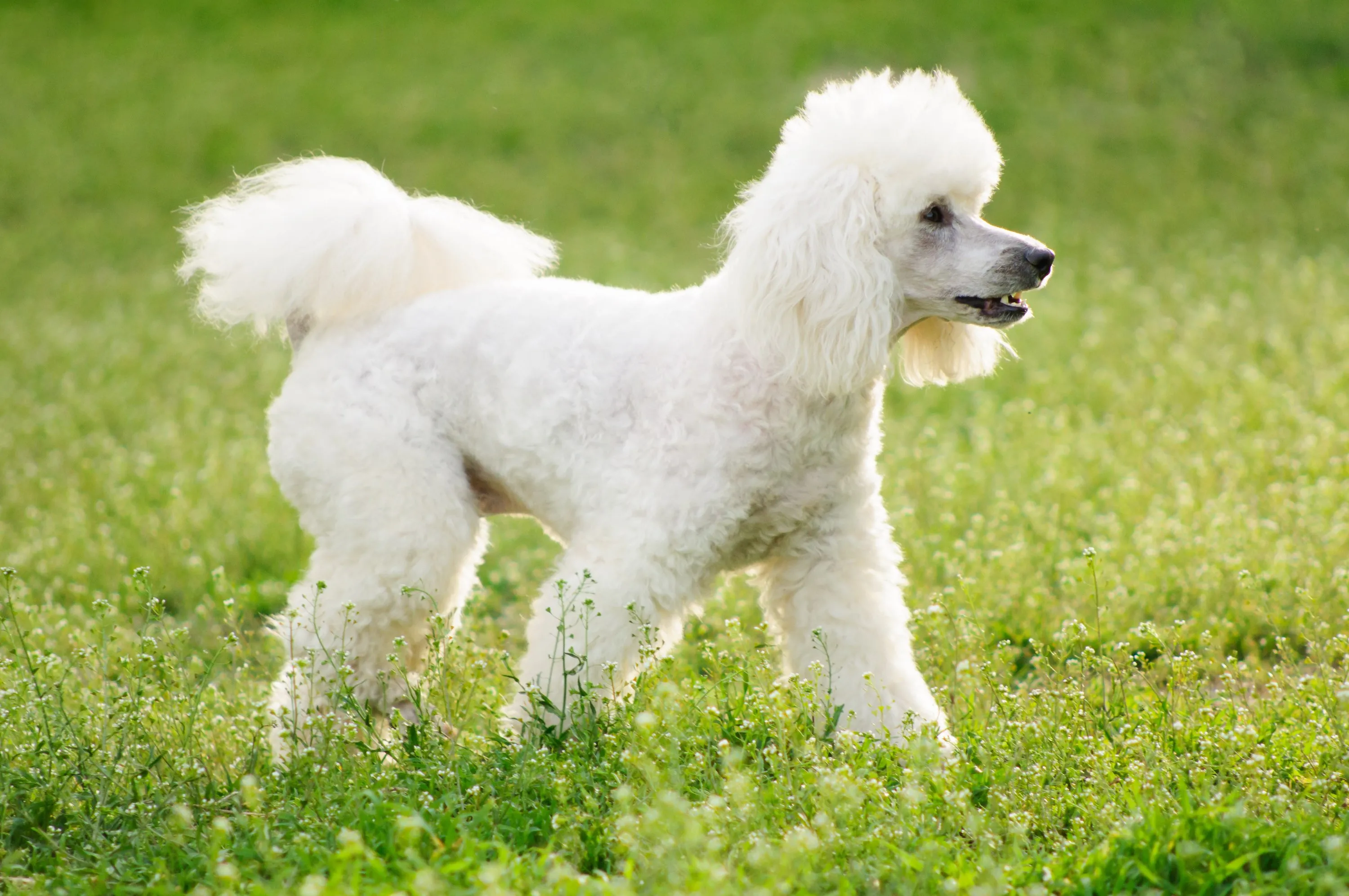 A white Standard Poodle with a groomed coat
A white Standard Poodle with a groomed coat
Poodles are perhaps the most well-known “hypoallergenic” breed. They come in three sizes: Toy, Miniature, and Standard. Their distinctive curly coat doesn’t shed much, but it requires regular grooming to prevent matting. Poodles are renowned for their intelligence, trainability, and playful nature. They thrive on interaction and require mental stimulation to prevent boredom. Whether you prefer a tiny companion or a larger, more athletic dog, there’s a Poodle size to fit your needs. You can explore more about the best small dog breeds that don’t shed which often include Poodles in their rankings.
2. Yorkshire Terrier
 A blue and tan Yorkshire Terrier lounging on an armchair
A blue and tan Yorkshire Terrier lounging on an armchair
Yorkshire Terriers, or “Yorkies,” are small, spirited dogs with long, silky coats that shed minimally. Despite their small size, they possess bold personalities and are very affectionate towards their families. Yorkies adapt well to various living environments, from houses to apartments, as long as they receive ample attention. Their grooming requires daily brushing to keep their coat tangle-free.
3. Shih Tzu
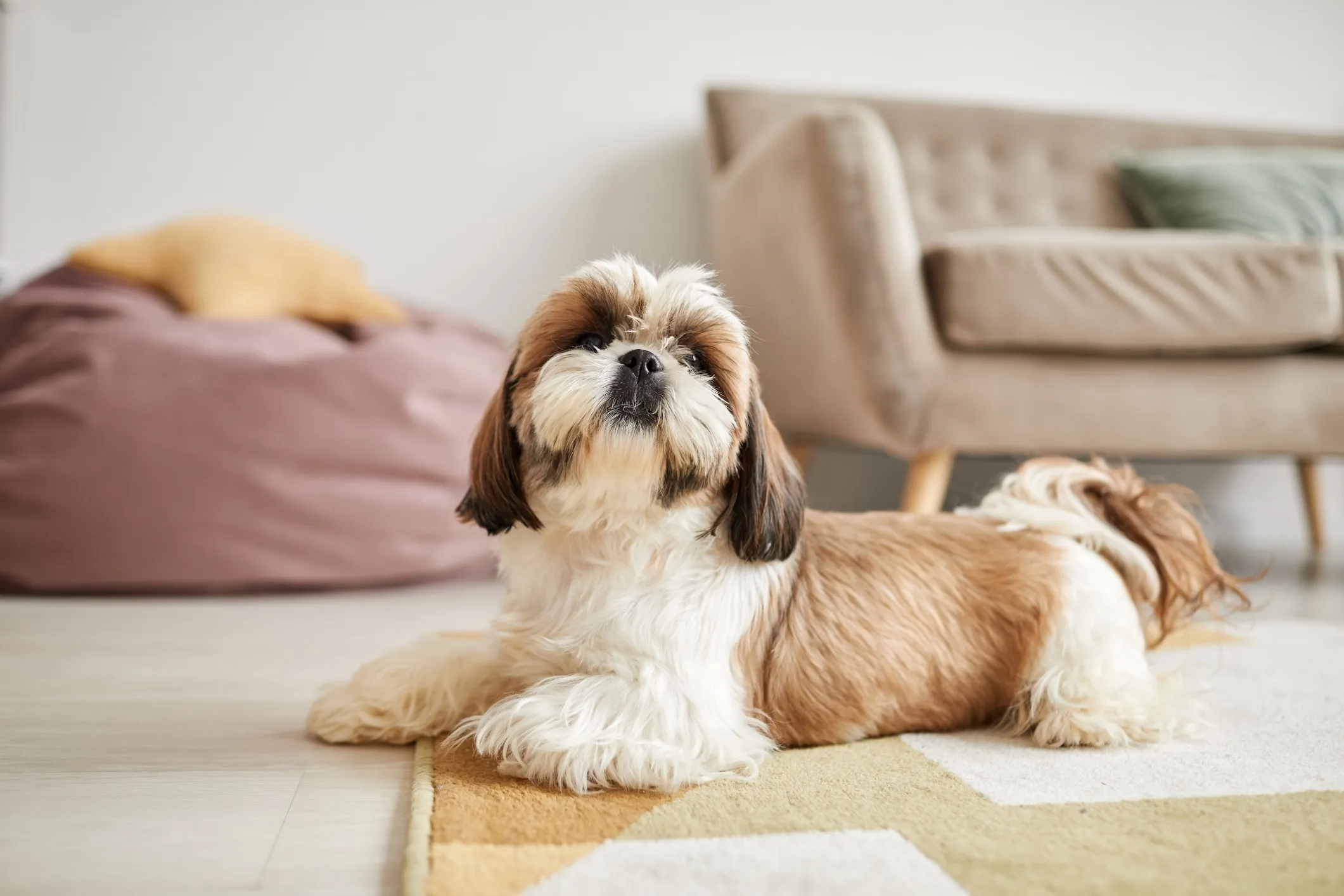 A brown and white Shih Tzu lying on a living room floor
A brown and white Shih Tzu lying on a living room floor
The Shih Tzu is an ancient companion breed with a luxurious, flowing coat that sheds very little. Known for their friendly disposition and affectionate nature, they are well-suited for families. However, their brachycephalic (flat) faces make them prone to certain health issues like overheating and breathing difficulties, and they can be susceptible to tear stains. Regular grooming and attention to their specific health needs are essential.
4. Miniature Schnauzer
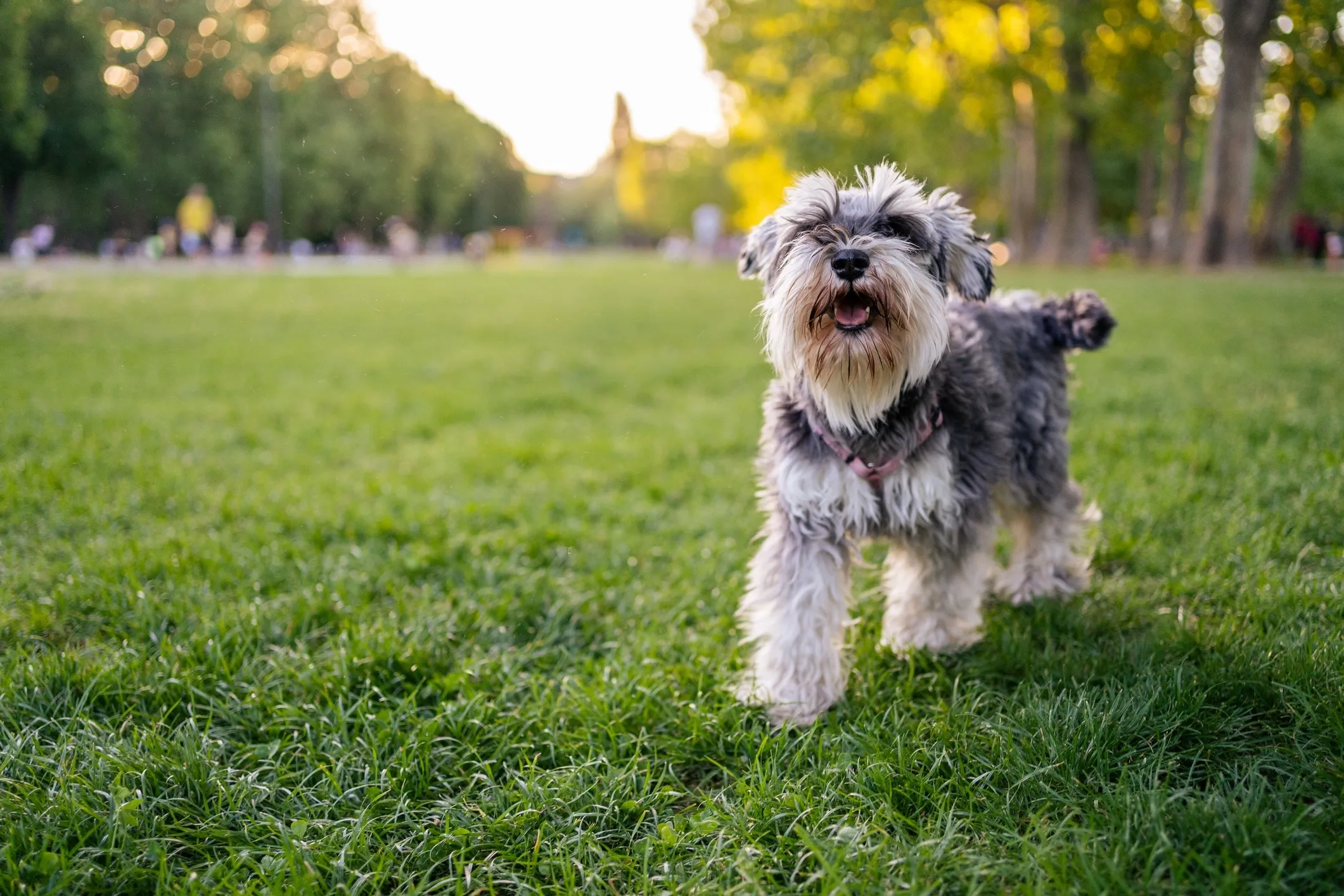 A salt and pepper Miniature Schnauzer wearing a pink harness in a park
A salt and pepper Miniature Schnauzer wearing a pink harness in a park
The smallest of the Schnauzer breeds, the Miniature Schnauzer, is a smart and sturdy dog with a wiry coat that sheds minimally. They are adaptable to different living situations and energetic, requiring at least an hour of exercise daily. Their distinctive beard and eyebrows add to their charm. Regular brushing and occasional hand-stripping or professional grooming help maintain their coat’s condition.
5. Bichon Frise
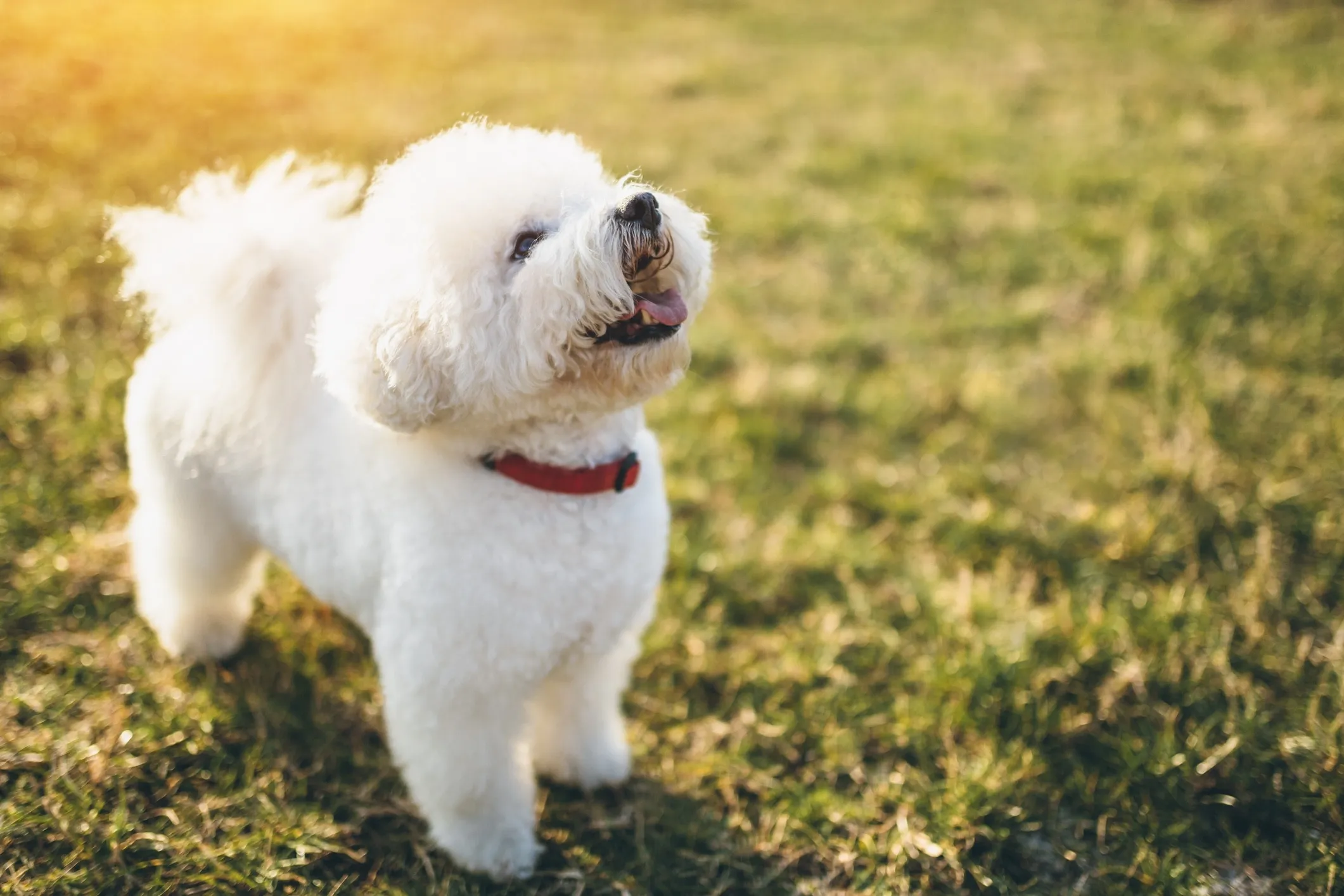 A white Bichon Frise dog looking up in the grass
A white Bichon Frise dog looking up in the grass
Bichon Frises are small, cheerful, and affectionate dogs with a signature curly, white coat that is very low-shedding. Their intelligence makes them highly trainable, and they excel with positive reinforcement methods. Bichons are known for their playful antics and make wonderful family pets. Consistent grooming is necessary to keep their coat fluffy and free of mats.
6. Portuguese Water Dog
 A black and white Portuguese Water Dog wearing a red bandana in front of water
A black and white Portuguese Water Dog wearing a red bandana in front of water
Originally bred to assist Portuguese fishermen, the Portuguese Water Dog is a medium-sized breed with a thick, curly, non-shedding coat. These dogs are intelligent, highly trainable, and possess a friendly demeanor. They are energetic pups that require regular exercise, with swimming being a particular favorite due to their love for water. This breed is a great example of list of small dogs that don’t shed that also includes medium-sized options.
7. Labradoodle
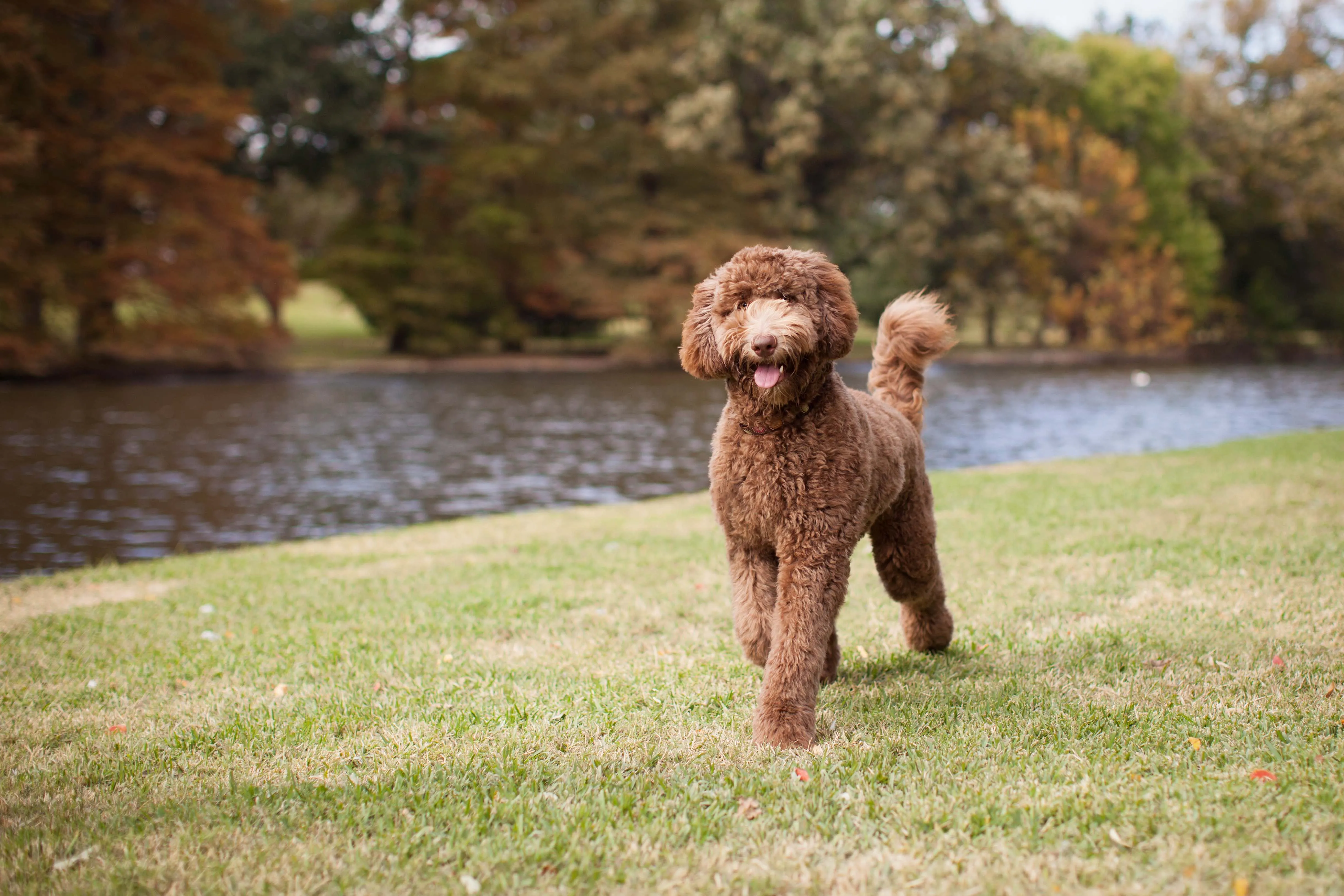 A brown Standard Labradoodle walking in a park
A brown Standard Labradoodle walking in a park
A cross between a Labrador Retriever and a Poodle, the Labradoodle was initially bred to be a hypoallergenic service dog. They are known for their intelligence, friendly nature, and trainability, making them excellent family pets. Labradoodles are highly social and gentle, especially when well-exercised and socialized from an early age. Their coat type can vary, but many exhibit low-shedding qualities.
8. Goldendoodle
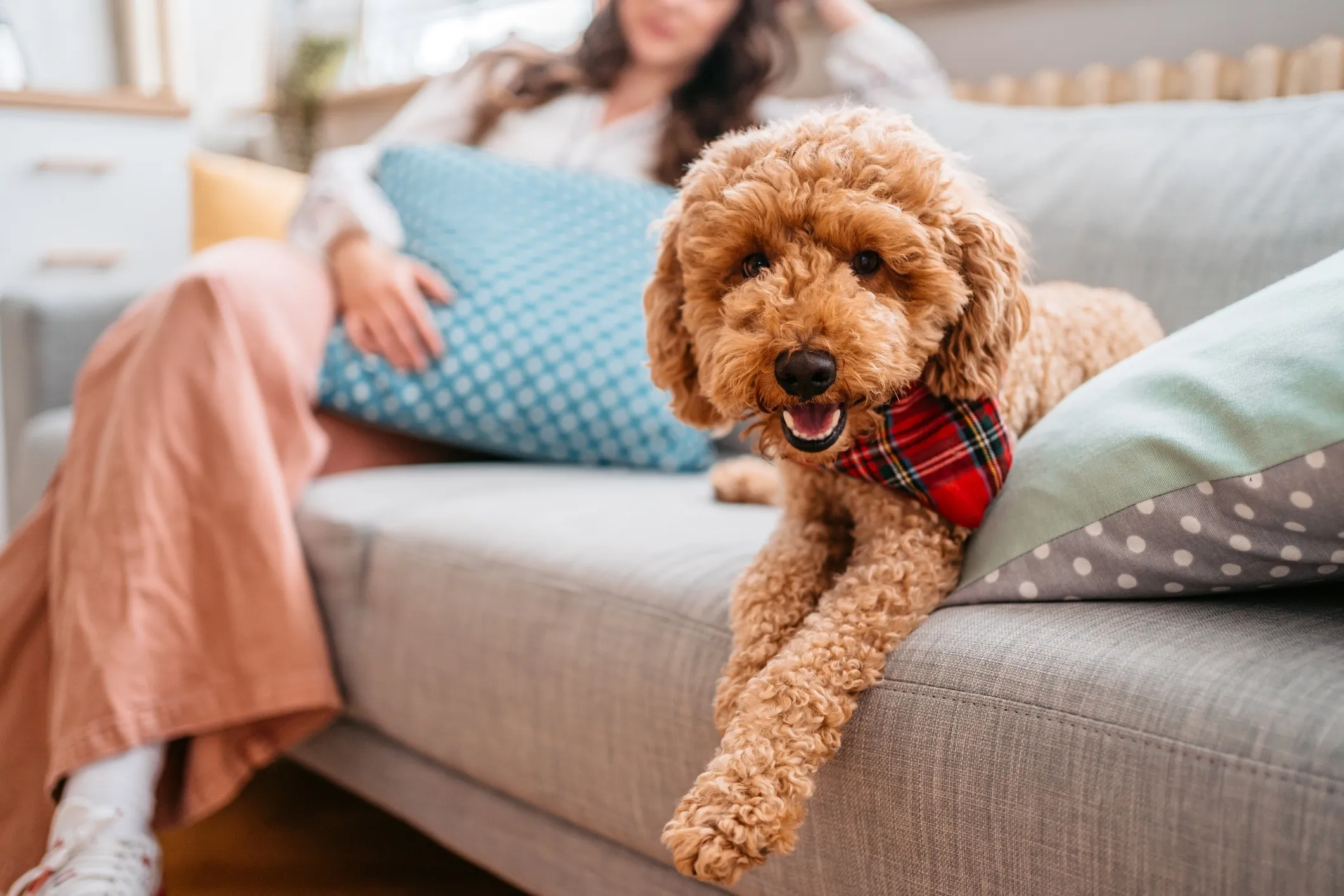 A Goldendoodle lying on a couch with a person in the background
A Goldendoodle lying on a couch with a person in the background
Similar to the Labradoodle, the Goldendoodle is a cross between a Golden Retriever and a Poodle. These dogs also tend to be low-shedding, possess a friendly and intelligent nature, and are highly trainable. While many have golden coats, their coloration can vary. Frequent grooming with a slicker brush is essential to prevent matting of their soft coats.
9. Soft Coated Wheaten Terrier
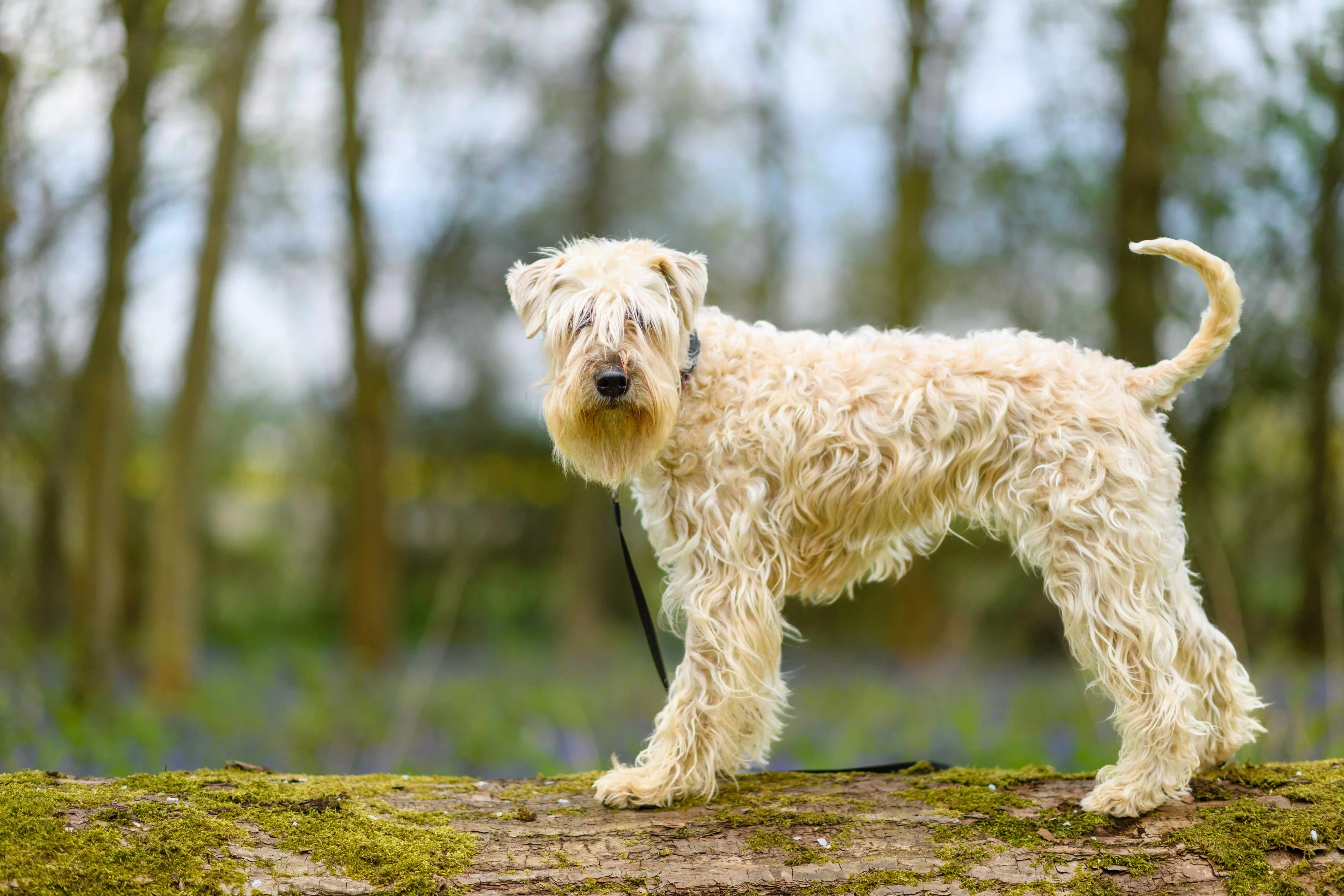 A Soft Coated Wheaten Terrier dog on a log
A Soft Coated Wheaten Terrier dog on a log
The Soft Coated Wheaten Terrier is a medium-sized Irish breed characterized by its unique, silky, wheat-colored coat that sheds minimally. These terriers are energetic and require ample exercise and mental stimulation to maintain good behavior. Their playful and affectionate nature makes them wonderful companions. Regular brushing is crucial to prevent their soft coats from tangling.
10. Coton de Tulear
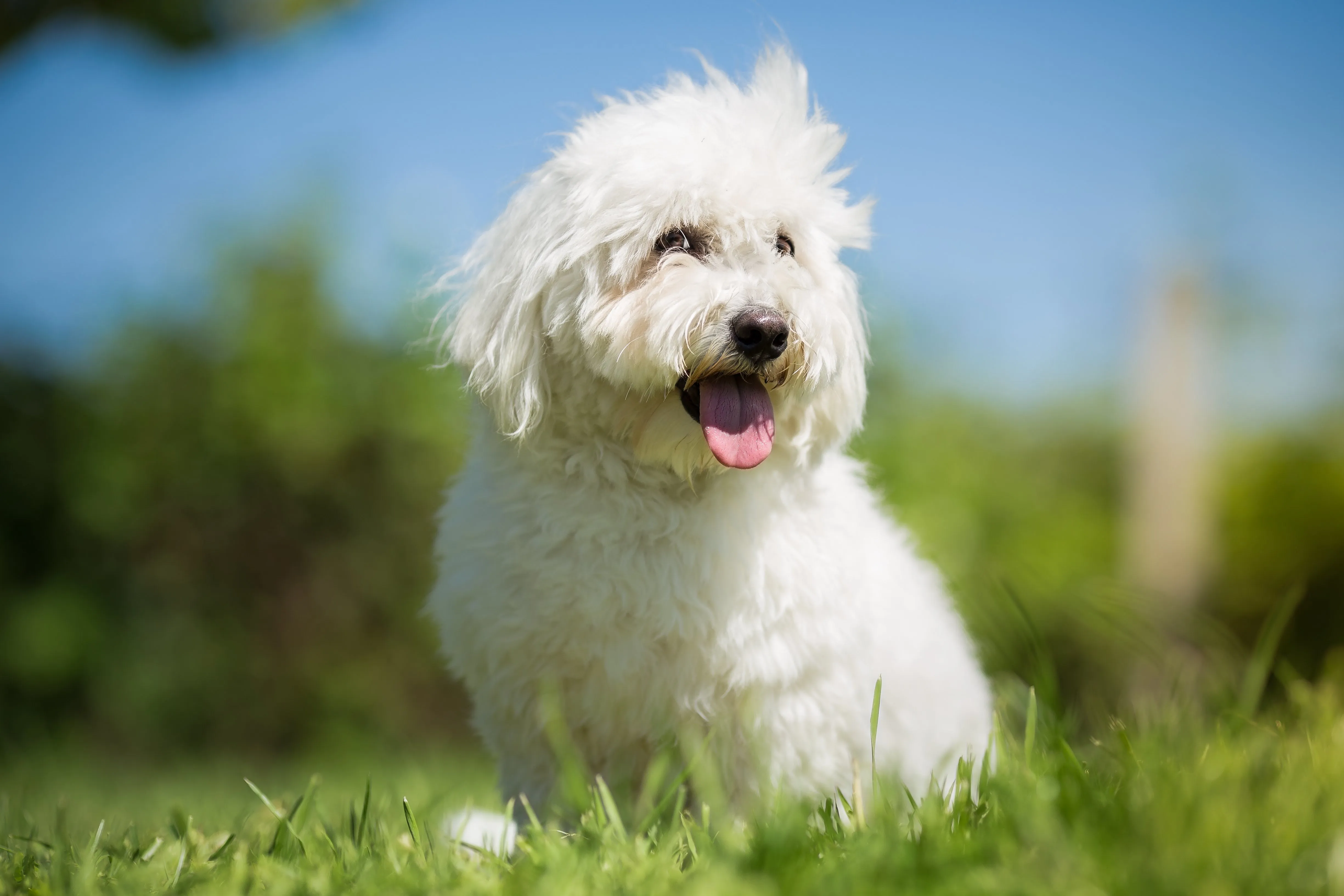 A white Coton de Tulear sitting in grass with hair blowing in the wind
A white Coton de Tulear sitting in grass with hair blowing in the wind
Originating from Madagascar, the Coton de Tulear is a small, white, fluffy breed with a low-shedding coat. They are known for their cheerful, easygoing nature, making them good companions for children and other pets when properly introduced. Their soft, cotton-like coat requires regular grooming to stay in top condition.
11. Schnoodle
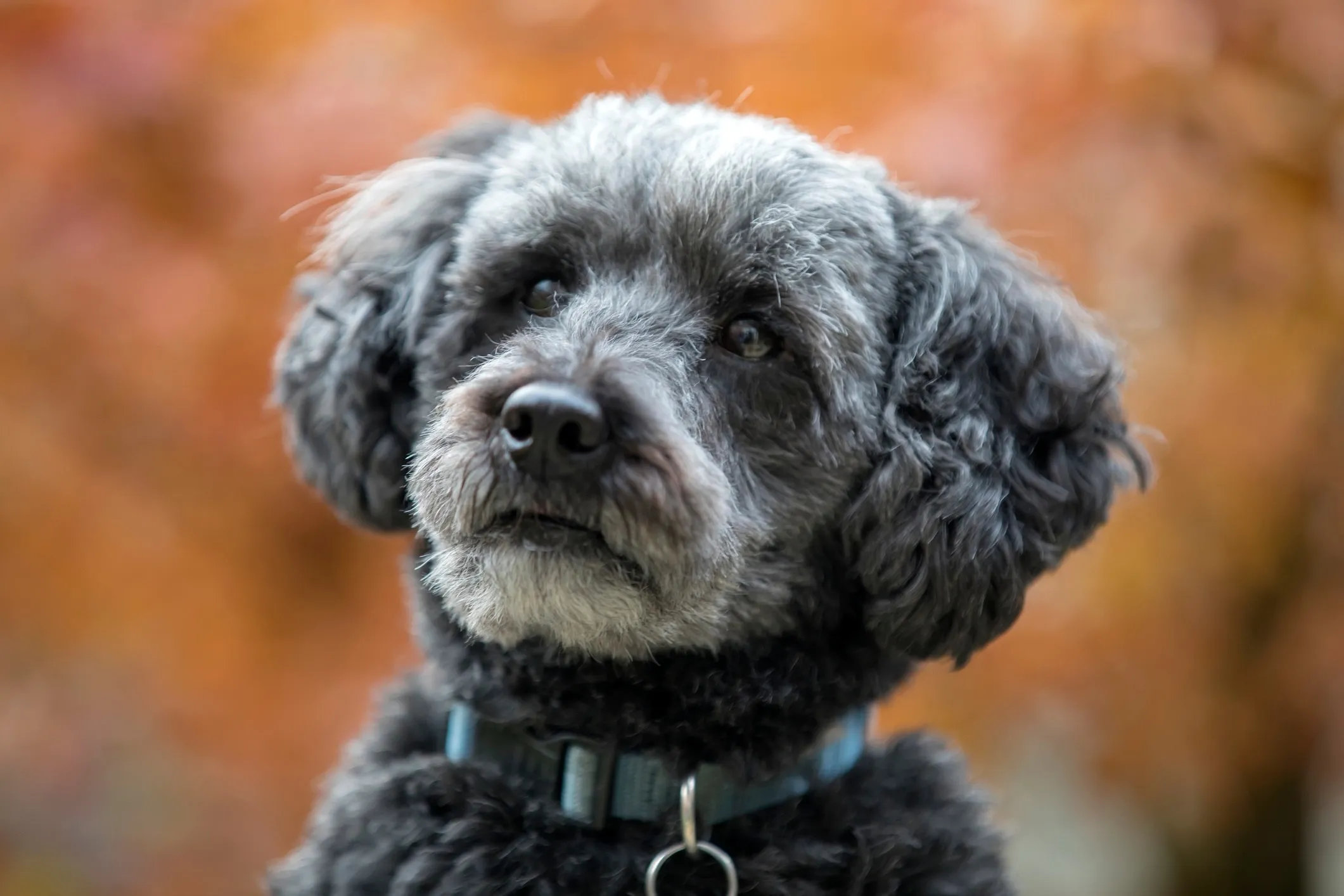 A gray Schnoodle close-up
A gray Schnoodle close-up
The Schnoodle is a crossbreed that combines two hypoallergenic breeds: the Schnauzer and the Poodle. This results in a dog with a coat that can be curly or wavy but is consistently low-shedding. Schnoodles inherit intelligence and a friendly disposition from both parent breeds, making them adaptable and good-natured pets.
12. Bolognese
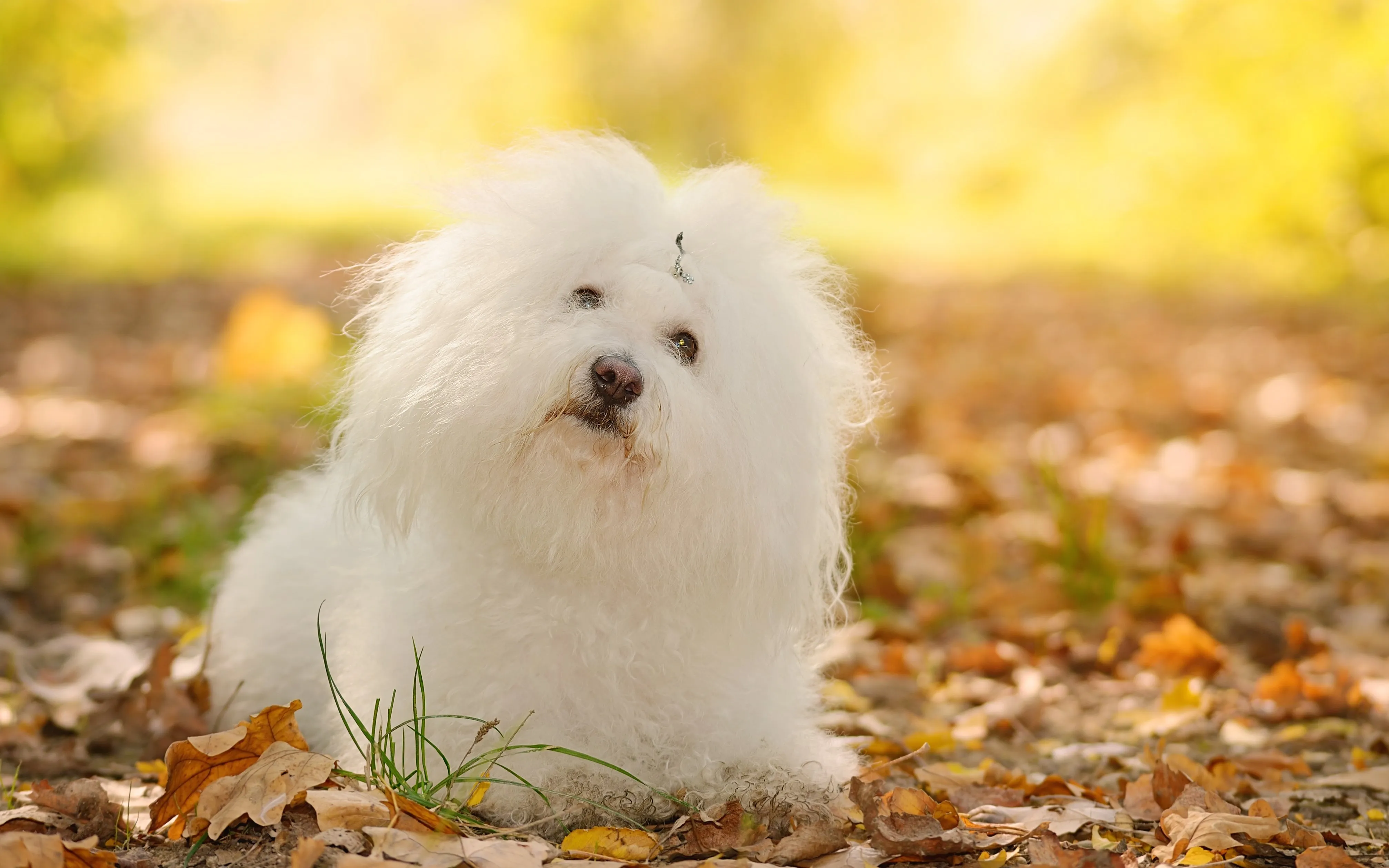 A white Bolognese dog sitting in an autumn forest
A white Bolognese dog sitting in an autumn forest
The Bolognese, originating from Italy, is a small, fluffy white dog with a distinctive low-shedding coat. These dogs are playful and easygoing, generally getting along well with children and other pets. They can adapt to various living situations and require consistent grooming to maintain their beautiful coat.
13. Maltese
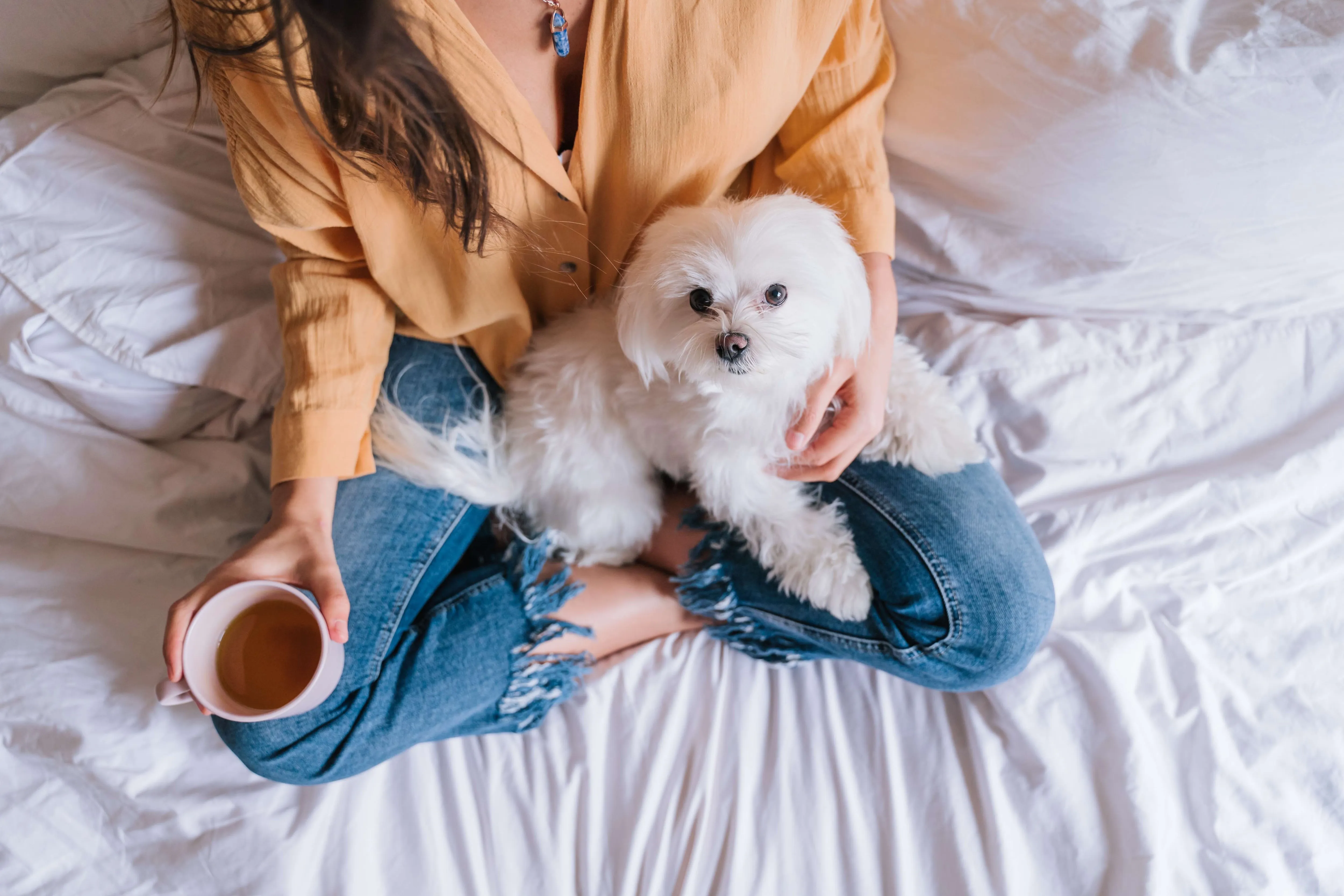 A woman holding a white Maltese dog on a bed
A woman holding a white Maltese dog on a bed
The Maltese is a small, elegant dog renowned for its luxurious, long white coat that sheds very little. They are affectionate and playful companions, though their grooming needs are significant, especially if you prefer to keep their hair long. A shorter “puppy” cut can simplify maintenance.
14. Bedlington Terrier
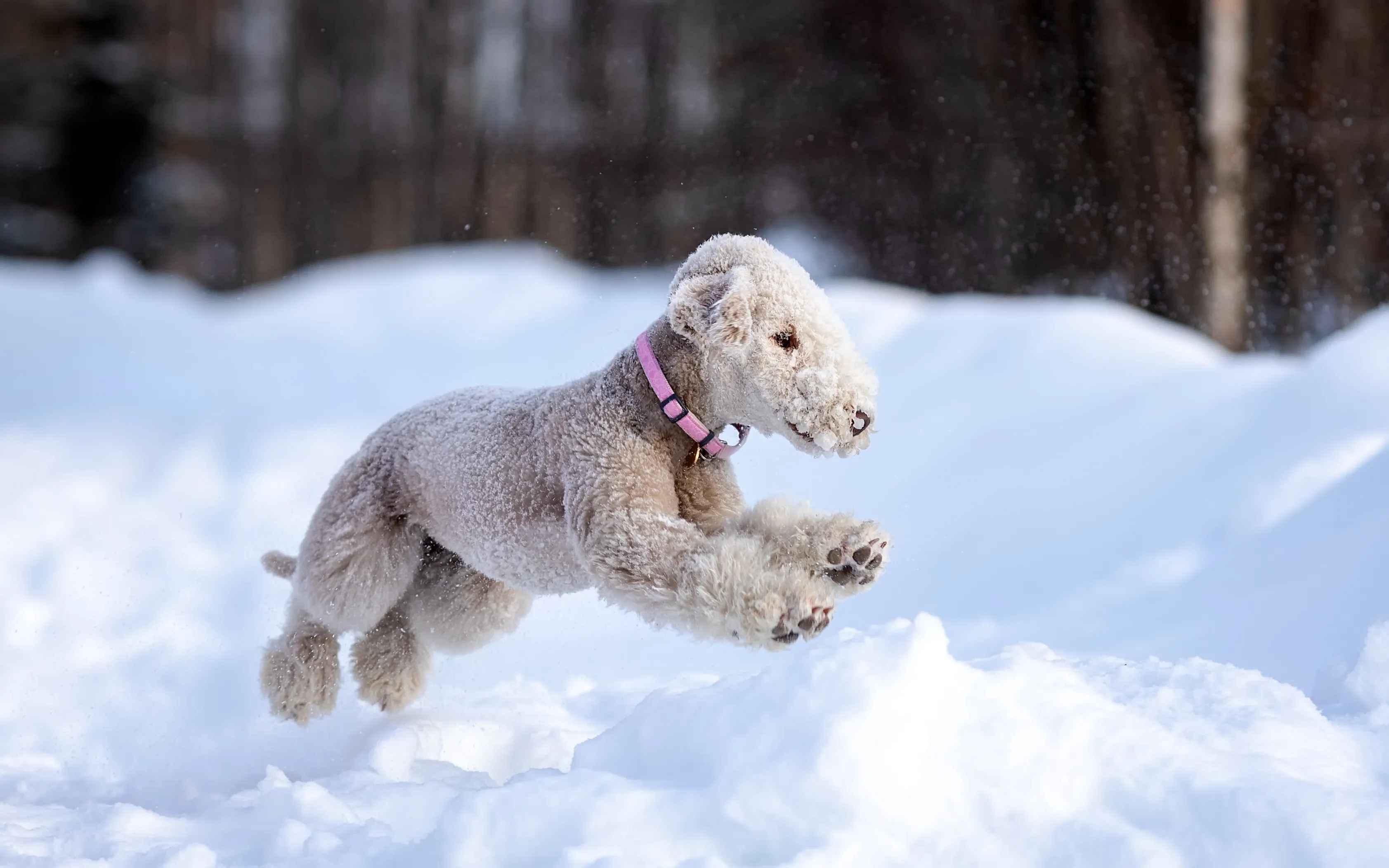 A white Bedlington Terrier running through snow
A white Bedlington Terrier running through snow
Often described as resembling a lamb, the Bedlington Terrier is a small, curly-haired breed with a distinctive “topknot” hairdo. They are known for their low-shedding coats and their affectionate nature, preferring to be close to their owners. However, they can develop separation anxiety if left alone for extended periods.
15. Whoodle
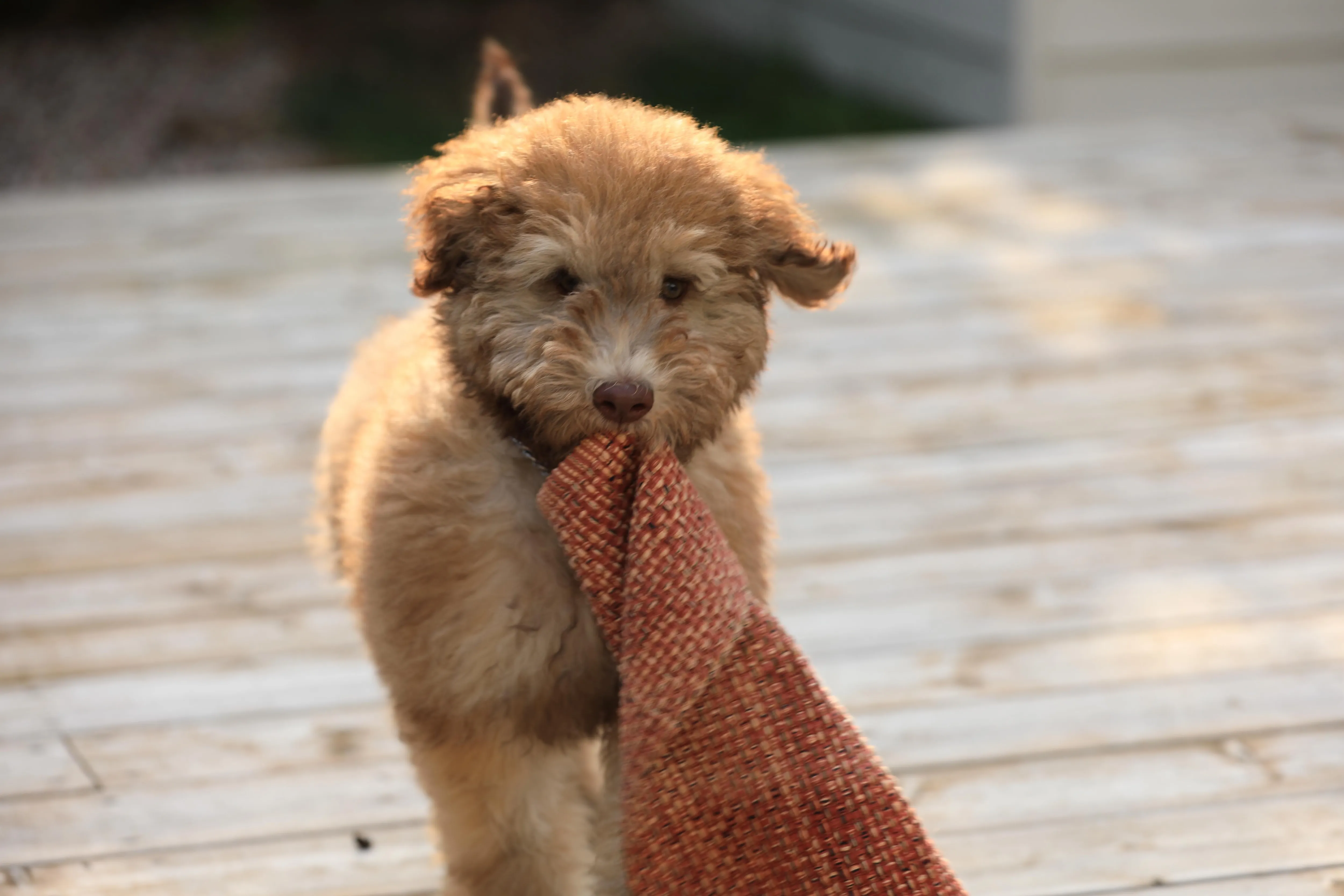 A tan Whoodle puppy dragging a wash cloth
A tan Whoodle puppy dragging a wash cloth
A delightful cross between a Soft Coated Wheaten Terrier and a Poodle, the Whoodle is a friendly, intelligent, and very low-shedding dog. They inherit their affectionate nature from both parent breeds, making them excellent family companions. Regular grooming is necessary to manage their wavy or curly coats.
Essential Tips for Living With a Low-Shedding Dog
Choosing a low-shedding dog breed is a significant step towards managing allergies, but it’s not the only factor. To further minimize allergens and ensure a healthy environment for both you and your pet, consider these important tips:
Maintain a Rigorous Grooming Schedule
Even dogs that don’t shed much require consistent grooming. Regular brushing, ideally daily, helps to remove loose dander and prevent matting, especially in breeds with curly or long coats. Baths every four to six weeks, using a gentle dog shampoo, can also help reduce allergens. For those with severe allergies, specialized dander-reducing shampoos might be beneficial. Professional grooming appointments for trimming and specific coat care are also recommended for many of these breeds.
Keep Your Home Clean and Allergen-Free
A clean living space is paramount when managing dog allergies. Regular vacuuming with a HEPA filter vacuum, dusting surfaces, and frequent washing of pet bedding and human linens will significantly reduce airborne dander. Utilizing air purifiers with HEPA filters can also help trap allergens circulating in the air. Ensuring good ventilation in your home by opening windows when possible can also contribute to a fresher, allergen-reduced environment.
Consult with Healthcare Professionals
If you have significant allergies, it is crucial to consult with your doctor or an allergist. They can provide personalized advice on managing your symptoms, which may include medication, nasal sprays, or immunotherapy. Understanding how to manage your allergies will allow you to enjoy your canine companion without constant discomfort. Avoiding direct contact with a dog’s saliva and urine can also help minimize reactions.
By carefully selecting a low-shedding breed and implementing a diligent approach to grooming and home cleanliness, you can significantly enhance your quality of life and enjoy the profound bond that comes with sharing your home with a dog. Discovering small dog breeds that don’t shed a lot can open up a world of possibilities for allergy-prone pet lovers.
Conclusion
Living with allergies doesn’t have to mean living without a dog. The breeds highlighted above represent a fantastic starting point for anyone seeking a small to medium-sized canine companion that sheds minimally. Each breed offers a unique personality and set of traits, ensuring there’s a perfect match for almost every family. Remember, while these breeds are excellent choices for allergy sufferers, individual reactions can vary. Spending time with the breed you’re interested in and consulting with your healthcare provider are essential steps in making your dream of dog ownership a reality. With the right breed and a commitment to proper care, you can welcome the joy and companionship of a furry friend into your life, allergy concerns notwithstanding.
